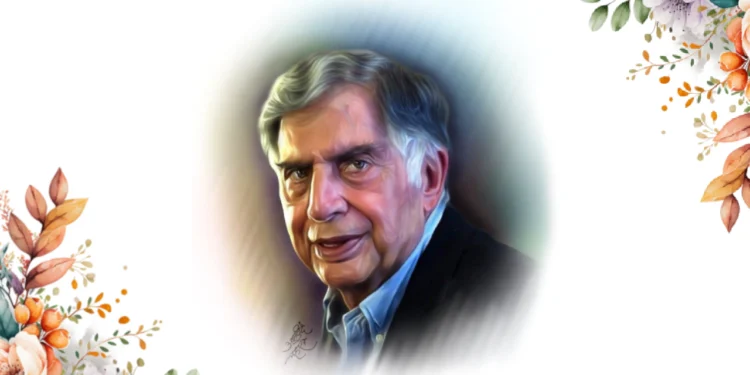Ratan Naval Tata, born on December 28, 1937, was not only a titan of industry but a beacon of integrity, humility, and philanthropy in modern India. Over his remarkable life, he transformed the Tata Group into a global powerhouse and devoted himself to the betterment of society. From his early years to his passing on October 9, 2024, Ratan Tata’s life was marked by visionary leadership, love for animals, and a commitment to social welfare.
Early Life and Education
Ratan Tata was born into the illustrious Tata family, known for its contributions to Indian industry and philanthropy. His parents, Naval and Sooni Tata, separated when he was just seven, and Ratan was raised by his grandmother, Lady Navajbai Tata. Despite this challenge, he grew up with a strong sense of discipline and compassion, values that would define his life and career.
Tata’s academic journey took him to Cornell University, where he studied architecture and engineering. Although architecture was his chosen field, his return to India in the 1960s saw him take on responsibilities within the family business. He would later attend Harvard Business School’s Advanced Management Program, preparing him for the leadership roles that awaited him.
Leadership at Tata Group: A Visionary Businessman
In 1991, Ratan Tata became the chairman of Tata Sons, succeeding his uncle, J.R.D. Tata. His leadership marked a period of significant transformation for the Tata Group, which consists of over 100 companies, ranging from steel, automobiles, and telecommunications to hospitality. Under his guidance, Tata expanded its global footprint with several landmark acquisitions, including:
- Tetley Tea (2000): This was one of the first steps in Tata’s global journey, bringing a British tea brand under an Indian conglomerate.
- Corus Steel (2007): This acquisition made Tata Steel one of the world’s largest steelmakers.
- Jaguar Land Rover (2008): One of the most high-profile acquisitions, this move showcased Tata’s ambition to become a global leader in the automotive sector.
In India, Ratan Tata’s leadership was instrumental in developing iconic products, including the Tata Indica, the country’s first passenger car, and the Tata Nano, the world’s most affordable car, aimed at making vehicle ownership accessible to the common man.
Tata’s vision wasn’t just about expanding business—it was about elevating India’s position on the global stage while keeping the company’s deep-rooted values of ethics and responsibility intact. He emphasized integrity in business and avoided entering industries like alcohol and tobacco, which he believed did not align with the Tata ethos.
Philanthropy and Nation Building
Ratan Tata was not just a businessman; he was a philanthropist at heart. A significant portion of the profits from Tata Group’s companies were channeled into various charitable causes through the Tata Trusts, which he chaired after stepping down from active business leadership in 2012.
The Tata Trusts funded initiatives in education, healthcare, and rural development. Some key initiatives include:
- Tata Institute of Social Sciences and Tata Memorial Hospital, which provide world-class education and healthcare services.
- Tata-Cornell Institute for Agriculture and Nutrition, which aims to reduce poverty and improve nutrition in India.
- During the COVID-19 pandemic, Tata Trusts committed large sums to support healthcare infrastructure and vaccine development.
Love for Animals
Ratan Tata was known for his deep compassion for animals. He was a passionate advocate for animal welfare and often used his influence and resources to support this cause. He personally adopted several stray dogs and was actively involved in promoting shelters and animal care centers. In 2020, he launched a COVID-19 initiative to support stray animals affected by the lockdown, further cementing his legacy as a man of empathy.
His social media presence also reflected this, with posts often showing his interactions with animals, from dogs to elephants. His love for animals was an extension of his belief that compassion should transcend beyond human beings.
Personal Legacy and Recognition
Ratan Tata’s humility and simplicity were often noted. Despite his monumental achievements, he lived a relatively modest life and remained unmarried. He shunned the limelight, always attributing the success of the Tata Group to his team rather than his personal leadership. His final public statements, where he expressed gratitude to those who cared about his health, reflected his enduring grace and humility.
Over his lifetime, Ratan Tata received numerous accolades, including India’s second-highest civilian award, the Padma Vibhushan (2008), and international recognitions such as the Knight Grand Cross of the Order of the British Empire. His contributions to industry, philanthropy, and society were unparalleled, and he was a guiding light for many business leaders.
Passing and Tributes
Ratan Tata passed away on October 9, 2024, at the age of 86, after battling illness. His death marked the end of an era, and tributes poured in from all corners of the world. Prime Minister Narendra Modi called him an “extraordinary human being,” while business leaders like Anand Mahindra and Gautam Adani paid heartfelt tributes, acknowledging his immense contributions to India and the world





